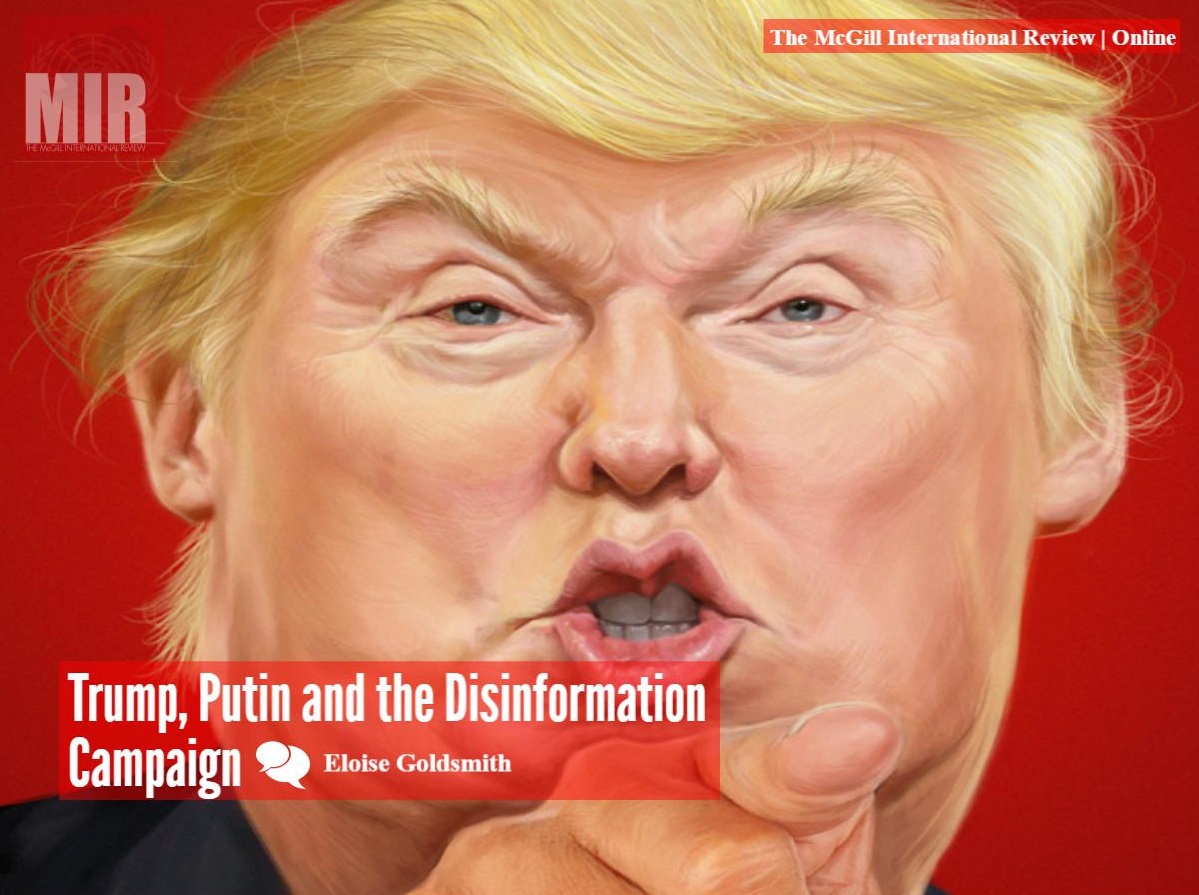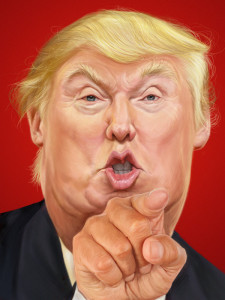Trump, Putin and the Disinformation Campaign

With Donald Trump lagging behind Hillary Clinton by more than 70 percent in the polls following multiple allegations of sexual assault, it seems the election may already be won. Vladimir Putin, who has openly and repeatedly conveyed his desire for a Trump presidency, is among those disaffected by the likelihood of a Clinton landslide. Clinton has promised a hardline policy towards Russia, even arguing that Trump’s warm attitude towards Putin is “unpatriotic” and asserting that Putin is the “grand godfather” of extreme nationalism. Clinton’s loaded rhetoric fails to convey that the Trump-Putin relationship speaks to something larger than mutual anti-liberal sentiment. Similar to Putin’s presidency in Russia, Donald Trump’s campaign has engaged in a war on information, relying consistently on certain counterfactuals and ignoring wide truths in appealing to sections of the electorate. The 2016 election cycle marks a departure from status quo political lying because it reveals and takes advantage of voter indifference towards the truth, indicating troublesome implications for democracy.

To be clear, Hillary Clinton is also guilty of lying. She lied about her use of a private email server while serving as Secretary of State, breaking government regulation concerning transparency and security and creating a situation where classified information was vulnerable to hacking. Clinton’s explanation of donations given to the Clinton Foundation during her time at the State Department also raises questions about her truthfulness. She has, however, paid for it in public opinion. A Gallup poll from September showed that 33% of U.S. would describe Clinton as “honest and trustworthy,” while 35% would describe Trump as such. Information published by PolitiFact, an organization that rates the accuracy of statements given by elected officials and political notables, contrasts public opinion polls. 51% of the statements made by Hillary Clinton that PolitiFact has checked scored within “True” or “Mostly True” while 12% fell within “False” or “Pants on Fire.” Donald Trump has scored a 14% and 52% respectively.
This suggests that the amount both candidates publicly misrepresent facts or lie does not correlate with who is labeled “a liar.” Clinton has admitted her error in handling classified emails, but this has not significantly redeemed her image in the public eye. Far from admittance, Donald Trump campaign has been characterized by asserting non-factual information, and then defending his position when it’s validity is challenged. Trump’s assertion on multiple occasions that he did not support the 2003 Iraq War, which is something he did during a 2002 radio interview, is one revealing example.
Even his mantra that he can help America “win” because it is currently “losing” falls within the counterfactual. Trump fails to substantiate these claims beyond broad statements about defeating ISIS, dismantling Obamacare and reducing immigration, which are often contradictory or untrue. Trump elaborated his economic platform during a speech in August, but his plan to create jobs and prosperity was riddled with overgeneralizations and misleading informatio. The claim that the unemployment rate is in reality much higher than the 5% given by the federal government, a figure researched by respected economists of diverse political leaning, conveys how the base of his policies are rooted in non-fact.
Despite his campaign of non-truths and a week of unprecedented controversy, Trump still enjoys 42% of the popular vote. It is unlikely he will win in November, but the success of his campaign speaks to a shift in political culture. Demands for truth in political discourse have waned and checking the validity of Trump’s claims is less important than renouncing the political establishment in Washington. The liberal media is complicit in this shift as well. The media frenzy around Trump, often in attempts to denounce or fact check him, has saturated society with his message. By highlighting his nonfactual assertions, the media gives Trump the opportunity to defend his position, reinforcing his narrative at the expense of the real truth.
Vladimir Putin’s Russia is categorized by a similar indifference to political truth. Journalist Peter Pomerantsev in his 2014 book Nothing Is True and Everything is Possible describes a Russian political culture where the Kremlin switches messages at will in order to keep the “140-million-strong population entertained, distracted, constantly exposed to geopolitical nightmare, which if repeated enough times can become infectious” (198). There is a game ideological musical chairs underway. Religious patriot politicians who today advocate for bans on homosexuality were proponents of modernization and pro-Western orientation twenty years ago. Before that they were devoted Communists. Today they reiterate the Kremlin’s policies lend legitimacy to Putin and the ruling parliamentary party, United Russia.
Compared with 2011, when widespread anti-government protests took place, criticisms of system and demands for the truth have waned. In an article on popular discontent in 2011, scholar Triesman explains that opposition did correspond to an objective decrease in Russia’ economic performance. Rather, protests were related to public willingness to connect domestic grievances with governance and the political system. It seems Russians today are less interested in holding the government accountable for the truth or their actions. Although largely hollow, democratic processes do still operate in Russia. Putin even appointed a respected human rights advocate, Ella Pamfilova, to the head of the Central Election Commission to oversee the latest parliamentary elections in September. However, last month’s Duma elections convey an increase in voter apathy, with voter turnout down more than 10% from elections in 2011. Pomerantsov corroborates this indifference in describing his experience working for Russia’s largest TV channel, Ostankino, where the line between fact an fiction in reporting had become “irrelevant.”
Making use of indifference to the truth, Putin propagated some counterfactuals to rival Trump’s. After a Dutch-led investigation team uncovered “irrefutable” evidence that Russian troops were responsible for the downing of Malaysia Airlines Flight MH17, Putin dismissed the findings. Putin’s assertions are backed up by a Kremlin-funded media campaign that helps perpetuate his version of truth. News sources such as Russia Today, which publishes English-language content, consistently corroborate the government’s official line. An article titled “Death & lies: the only truth of flight MH17” reiterates the Kremlin’s view that the MH17 incident is part of a larger smear campaign by the U.S. against Russia.
Current political culture in Russia and Donald Trump’s campaign speak to a broader trend between the truth and the democratic process. Lying in politics has and always will be an unfortunate reality. There is, however, increasing evidence that popular attitudes towards lying have shifted. Both American and Russian voters are amenable to blending fact and fiction, so what does that mean for politics?
As Pomerantsev argues in his book, disinformation campaigns are dangerous because they preclude the possibility of rational argument. Without a clear line between truth and non-truth the foundation for debate and mutual understanding is taken away. During the presidential debates, discussing policy took a back seat while the candidates traded accusations of deceit, revealing how productive discussion is stymied without a foundational understanding of what is factual. With far fewer meaningful outlets for political participation, Russian voters face much more of a challenge in holding Putin and other leaders accountable to the truth. Hillary Clinton will likely become president in November and holding her accountable to the facts as well as promoting a political culture that aspires for truth is imperative. Donald Trump’s bid for presidency may be over, but his ascension into politics reveals something equally worrisome about Americans’ relationship with the truth.
